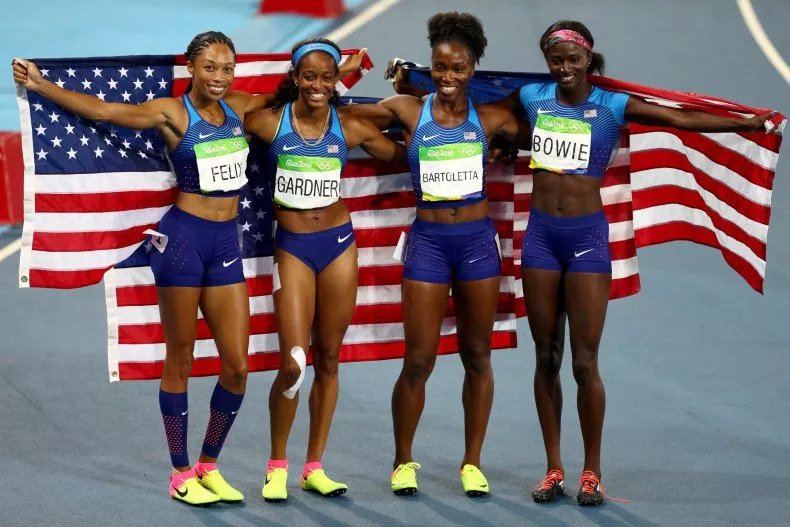
I was shocked and angry when rumors of Tori Bowie’s death began to circulate. My brain refused to believe that someone I’d stood on top of the world with was gone, and that she may have died alone.
Tori had the most joyful spirit and the most radiant smile. Her country accent punctuated a beautiful laugh. I felt the loss deeply. I used the remainder of my frequent flier miles to attend her funeral.
Red, white, and blue flowers framed a closed casket that I couldn’t believe she was in. I opened the program and began to read the obituary written inside for her. And it was then, in the pew at her funeral, as the choir sang an upbeat worship song, I learned that my teammate Tori had been pregnant.
I was already devastated about losing Tori. Upon learning the news of her pregnancy, I was completely shattered.
I learned of my own pregnancy after failing to make the 2020 Olympic Team, and I experienced a whole gamut of emotions.
I saw my entire plan and career fall apart as I stared at the word “yes” on the pregnancy test. Plus I knew all too well what the Black maternity mortality rate was and about unequal outcomes for black women in the healthcare system.
As a social work student, and especially having already survived my own horrifying experience with dismissive doctors, I was unwilling to risk putting myself in the hands of that system again.
Two years prior, I had become severely anemic due to extreme blood loss. For months the doctors wished only to treat the anemia with iron infusions. I had to fight to get a transvaginal ultrasound, which revealed a large hemorrhaging tumor in my uterus. I had emergency surgery three hours later.
As terrified as I was of being pregnant, I was more frightened by childbirth and the stark reality that I may not survive it. And so, just as soon as I learned I was pregnant, I made an appointment to terminate the pregnancy.
However, in the days leading up to the appointment, I began to feel strongly that this baby was meant to be mine; I was meant to be their mama. So my partner and I began to focus on how to survive childbirth in America.
When I called to set my first appointment, after answering a few of her questions about my age and race, my OBGYN tried to schedule my c-section over the phone.
“Excuse me?” I asked.
I wanted to have the baby vaginally. I was shocked to not have been given the option, and for this to have been decided without my input and before I’d ever stepped foot in the office or met any of the care team for the first time.
I knew that finding a doula and a new doctor would take time, so I decided not to move on from my current doctor right away. I wanted there to be as little disruption in my prenatal care as possible.
I was just about to make arrangements to tour a new hospital and birthing center when I went into labor at 26 weeks.
I had a contraction in the shower and as I dried my body I noticed there was blood on my towel. I wasn’t in pain and had I not been aware of the risks that so many Black women face, I could have been tempted to go lie down and try to sleep it off.
But I knew better. Even if it turned out to be nothing, it was better to be safe than sorry.
I was 6cm dilated when we were admitted. Doctors rushed in and out of the room preparing us for the likelihood that I’d be giving birth that night.
“Ideally, you’d stay pregnant,” one doctor said to me in passing. I held on to that. I needed to stay pregnant for a minimum of two more days to get the baby the full course of steroids needed to help kickstart his premature lungs.
The team put me in the Trendelenburg position, legs higher than my head, with the hopes that gravity could help keep the baby inside. I was not allowed food or drink because I could be rushed into surgery at any moment.
I developed a migraine and my breathing became labored, but my vitals were fine each time they checked, so they gave me painkillers and sleeping pills.

I’d made it 48 hours, the baby had gotten the full course of steroids, and my new goal was to buy him as much time in the womb as I could. Mentally, I could have held on forever, but physically my time was running out.
It took four days for my body to begin shutting down. I tried to turn my head to the right to look at my partner and couldn’t. I tried to squeeze his hand that was holding mine, but couldn’t. I tried to speak, but couldn’t. I tried to take deep breaths to push down the rising panic, but couldn’t.
Alarmed, my partner ran into the hallway to speak to the doctor, who rushed back in and took me out of the Trendelenburg position just as my heart rate and the baby’s heart rate tanked.
“That’s it!” The doctor shouted. “We’re taking him.”
Less than 90 seconds later I was being rolled into the OR, tears streaming down my face and prayers that my son and I would live to meet each other on my lips.
I knew what could happen and I was prepared. I had my advance medical directive and my will with me in my bag. I had been terrified of this reality and I was right to be.
My son and I survived, but the Black maternal health crisis is unacceptable, especially because it is preventable. It continues to be a problem because of systemic racism and racial bias embedded in the healthcare system.
As well-intentioned as healthcare workers are, what does it say about how equipped they are to care for others if some medical students still believe that black people experience pain differently than non-Black people, or that Black people literally have thicker skin than those of other races?
How do we move forward when J. Marion Sims, the man widely regarded as the father of gynecology, earned that distinction by experimenting on exclusively enslaved Black women without anesthesia?
We know that outcomes improve when more Black men and women become doctors, and we know that outcomes improve when doctors simply take the time to listen to their patients.
So, what can be done? So much.
On an individual level, those that aren’t affected by this reality should start listening and stop trying to explain away these statistics, believing the stories others with lived experiences are telling you.
For those of us who are directly affected by this dismal reality or want to actively combat this crisis, educate yourself and then relentlessly advocate on your own or others’ behalf.
Prioritize prenatal care, go to all of the recommended visits, ask all of your questions, and don’t rationalize away symptoms.
Be honest and open with your doctors and take someone to your appointments with you, especially if you don’t feel confident speaking up for yourself.
Inquire about the number of c-sections a hospital does—it’s often a good indicator of where their priorities are.
Individuals are more susceptible to change than systems and if enough of us are committed to this cause, then it stands to reason that we’d reach a critical mass.
Our babies deserve to have mothers, and we deserve to live.
Source: NewsWeek
